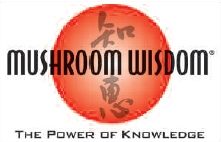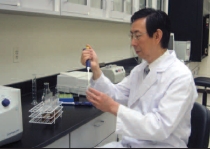Though they founded a pioneering mushroom supplements company called Mushroom Wisdom, president and CEO Mike Shirota and vice president Tomoko Nakamura are no mycologists (fungi specialists). Instead, they were initially inspired by a simple truth: mushrooms and the nutrients they contain can support many areas of human health.
This realization led them to an entrepreneurial design to bring mushroom supplements to the West, a place they’d been sorely lacking. “Nobody was doing that when we started. In the grocery market, shiitake mushroom was already getting popular as well as other culinary mushrooms. Nobody knew that mushrooms are good for your health. But, we knew,” says Shirota.
Making Room for Mushrooms
Both Shirota and Nakamura had been working on Wall Street when economic times changed. Shirota decided to go into business for himself, and Nakamura went to work for him. It was then that they were clued in to the benefits of mushrooms.
“I had an inquiry from one researcher in Japan, who was heavily involved in research on maitake extract against HIV and AIDS,” says Shirota. There were several mushroom-based anti-cancer pharmaceuticals in Japan, already well established and approved by Japanese authorities.
The researcher wanted to continue his studies, but lacked funding. “At that time, I had very good connection in the financial markets. I was visiting venture capitals and pharmaceutical companies to raise some funds for him,” says Shirota, adding that unfortunately, “It was a disaster.”
Shirota explains that maitake didn’t interest private investors because it is not patentable. The number of published studies on the fungus was large, and as a commercial entity, it was fixed firmly in the public domain, barring it from any private rights ownership. “That’s why I decided to make it a dietary supplement,” Shirota says.
The people behind Mushroom Wisdom (formerly Maitake Products, Inc.) had a steep learning curve in the early years. “We didn’t know anything: where to manufacture the products, how to price the products…we had no idea. But, we knew that we had something very good,” says Nakamura. The first step was overcoming some of the prejudice any company dealing in medicinal mushrooms was bound to face at that time.
“Even people in the industry were not aware of the benefits of medicinal mushrooms,” says Nakamura. She says the attitude of the average U.S. consumer back then amounted to a kind of “mushroomphobia”—the association between these fungi, growing in cold, dark places, and health had not yet clicked. In those early days, as now, Mushroom Wisdom was hard at work educating the public, in part by providing access to the mounds of research on mushrooms. “Of course, evidence is important. In Japan, everybody knows that mushrooms are good for your health. In the U.S. market, people are always asking, ‘Where is the evidence?’” says Shirota.
This void in mushroom awareness proved an obstacle, until some well-deserved recognition took root. “We struggled for the first one, one and a half years…I was lucky to get a hold of Dr. Robert Atkins,” says Nakamura.
The undeniable virtues of maitake mushroom, the basis for the company’s early flagship product, had Atkins paying attention, even devoting time to the subject on his radio show. “All of the sudden, some people started paying attention,” says Nakamura. People began to ask what maitake was all about, and where they could find it.
Nakamura describes this time period as a breakthrough for the company. The company began by selling whole maitake mushroom in caplet form and added the immune-boosting maitake extract D-Fraction to the mix in 1994. “That’s an important product for me, personally, because that product made this tiny company grow,” she says.
Roots in Research
Much of the ongoing research into mushrooms is undertaken solely by the company, headquartered in East Rutherford, NJ. There is also much collaboration, such as with Harry G. Preuss, M.D. of Georgetown University and with researchers at NY Medical College. Five or six studies are often underway at a given time, according to Shirota. “We have to educate the people. That’s number one. And, we have to take care of the safety of the product,” Shirota says.
|
|
|
Dr. Cun Zhuang, Ph.D., V.P. of Research & Development |
When it comes to research goals, “We look for new and unique things. The Lion’s Mane is a good example. Previous to our products, there had been some research on certain constituents, but we actually discovered a new class of compound,” says Mark Kaylor, vice president of education and research. Exciting recent research, detailed in the Research News section of this issue (page 10), has linked Maitake D-Fraction to cell death in human breast cancer cells.
Kaylor points out that despite thousands of years of historical use, serious mushroom study has only occurred over the last 30 years or so in Asia, and perhaps only 10 or so years in the West. This means there’s a lot of scientific ground to cover. “There are 50 studies out there on reishi and blood pressure, so why go do another study on reishi and blood pressure. We really want to expand our field of knowledge,” Kaylor says.
A Ripe Third Decade
As the company expanded its stable of medicinal mushroom supplements, it became evident that a name change was in order. Nakamura explains that it was Shirota’s idea to transition from Maitake Products to Mushroom Wisdom. She states, “Now, we are getting to the second stage of our growth, to become experts not only in maitake, but also in all medicinal mushrooms.”
Twenty years in business means a lot, according to Shirota. After its initial period, when the launch of D-Fraction meant market success and industry recognition, the company’s second decade saw the release of seven or eight more mushrooms into the market, he says. Now, it has rolled out condition-specific products in its Health Mate line, which combines mushrooms with other established ingredients like glucosamine and CoQ10 to help consumers in areas like joint and vision health.
Shirota likens the mushroom supplement market’s potential for growth to what has unfolded in other segments, like omega-3s and CoQ10. “I think the whole category of mushrooms is ripe for explosion,” Kaylor says. The company seeks further increase consumer awareness of the diverse health benefits mushrooms can provide. About that task, Kaylor states, “I think it’s a matter of capturing their imagination.” WF
Published in WholeFoods Magazine, September 2011











